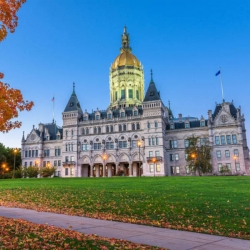The Bridgeport Casino legislation is dead — for the rest of 2018. Democrats in the Connecticut House of Representatives said the bill would not be called for debate in the Senate this week, which ends its chances of receiving a vote in the regular legislative session.
The session ends at midnight on Wednesday and no time was set aside to discuss the proposal, which passed by a 77-73 vote in the Connecticut House last week. State Rep. Charlie Stallworth (D-Bridgeport) said the debate would not happen, but “We would do the process again next year.”
The bill that would have approved a Bridgeport casino did not mention the word “Bridgeport”. Instead, the legislation called for a single casino license to be issued for some place in Connecticut, but with an open-ended licensing process.
All lawmakers knew the bill would have approved a Bridgeport casino licensing process. MGM Resorts set forth a plan last summer to build a $700 million casino on the Bridgeport waterfront. Since the Las Vegas casino company has the financial resources to outbid most other likely applicants, the general consensus is the bill would have led to the MGM Bridgeport Casino.
$500 Million Casino, 2000 Jobs
If approved, the resulting casino would have required $500 million invested and the promise of creating at least 2,000 permanent jobs. MGM Bridgeport would have created 5,000 temporary construction jobs and cost $700 million.
To assure only qualified casino developers would enter the bidding process, a $5 million license application fee would have been required. All non-winners in the process would have had the $5 million free reimbursed. The owners of Mohegan Sun and Foxwoods Casino had stated they would not have taken part in a Bridgeport casino licensing process.
Rosario and Candelaria Tout Progress
Proponents of the bill considered the process to be a moral victory these past two weeks. The fact a commercial casino bill passed in one house of the legislature was a landmark — and Bridgeport casino advocates believe is a stepping off point for 2019 and beyond.
State Rep. Christopher Rosario (D-Bridgeport Democrat) and State Rep. Juan Candelaria (D-New Haven), two of the most vocal supporters of the bill, said they take heart that the House approved such a measure, because of the longstanding relationship between the state government and Connecticut’s two tribal gaming authorities, the Mohegan Tribe and the Mashantucket Pequot Tribe.
Connecticut State Budget Most Important
Rosario and Candelaria say last week’s progress sets the table for the next legislative session, when the two hope to build a broader consensus on the casino issue. State Rep. Rosario said, “This is the first time in 25 years that any piece of gaming legislation has gotten out of the chamber, and we faced obstacle after obstacle after obstacle. To even get to where we were is herculean task, and I’m optimistic about our prospects next session.”
Lawmakers were more concerned about the yearly budget this time around, leaving little time or political capital for a casino bill. That is especially true in the Senate, said the bill’s sponsors. [The Senate] wants to do the budget. [The casino] is not one of their priorities,” said Candelaria.
The New Haven representative said that the budget is most important to everyone at the moment. Candelaria added, “A lot of the people that were pushing the casino also wear other hats. Obviously, we care about our regions and our constituents, but we are state representatives and we have to look out for the well-being of this state. We’re putting that [the budget] first.”
MGM Resorts and RCI Group Statement
MGM Resorts signaled its confidence in an eventual vote and its determination to keep trying later. In a joint statement, the Las Vegas casino company and its local partner (RCI Group) said, “A year ago, the bill never received a floor vote. This year, it passed the House. That is significant. We realize that change is hard and takes time, and we respect the delegation’s preference not to dominate debate with this issue with much to accomplish in a short time in the session’s final hours.”
State lawmakers face stark choices in the coming year. The Mohegan and Pequot tribes have contributed $7 billion to the state economy over the years and have developed a strong relationship with the legislature. Each year, the two gaming tribes contribute $270 million in slots revenues to the state budget.
At the same time, the slots revenue is expected to decrease to an estimated $203 million to $204 million next year when the MGM Springfield opens. The Mohegan and Mashantucket Pequot tribes are planning a joint venture in East Windsor, a suburb of Hartford about 30 miles from Springfield, as a way to retain slots revenues in the state. MGM Resorts, which has sued (and lost) to have its Bridgeport casino considered by the state legislature, proposes a casino in the verge of New York City — which would produce more casino revenues than a Hartford-area casino ever could.
Uri Clinton, the deputy legal counsel for MGM Resorts, argues that the New York City casino market is underserviced. The NYC greater metropolitan area only has 2 land-based casino operations: the Yonkers and Aqueduct raceways. MGM Bridgeport would thus draw a large casino crowd from New York. The prospect would further harm Foxwoods Casino and Mohegan Sun in the southeast portion of Connecticut, so one can expect they will call in every favor in the Connecticut legislature to assure a Bridgeport casino never happens.
Dannel Malloy: Opinion on Bridgeport Casino
As a good politician on a potentially controversial bill that was not likely to appear on his desk anytime soon, Gov. Dannel P. Malloy was noncommittal on the issue. Malloy said, “That’s not an issue that I’ve spent a lot of time on. I figured either it would get to my office, and I would spend time on it, or it wouldn’t get to my office, and I wouldn’t have to spend time on it.”

